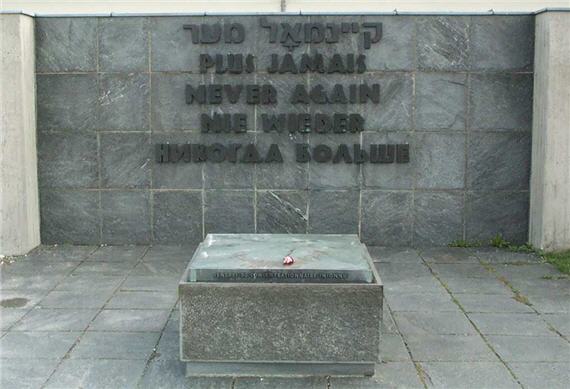Never Again (Except This Time)
My latest for The National Interest, "Never Again, Except This Time," has posted.
My latest for The National Interest, “Never Again, Except This Time,” has posted.
This Holocaust Remembrance Day, it’s worth noting an inconsistency present in public statements about atrocity prevention. As scholars Gerald Caplan, Samuel Totten and Amanda Grzyb pointed out recently, while U.S. presidents solemnly declare that “never again” will the world stand by and allow genocide to happen, they continue to stand by and allow genocide to happen.
There’s no reason to think this will change. Nor is it clear that it should.
While “never again” is a nice sentiment, it’s not a useful public policy. It’s seldom clear when the line has been crossed from an ordinary civil war into genocide. Even when it is, what precisely the United States and the international community ought do about it is hardly obvious, especially in the moment.
The core of the piece is a step-by-step examination of why literally every president from Jimmy Carter through Barack Obama have had weak responses to atrocities outlined by Caplan, Totten and Grzyb. It concludes:
This doesn’t necessarily mean that “never again” is mere lip service. There are actions short of military intervention that the United States and its allies and partners can take in response to atrocities. Indeed, many of the perpetrators of those pointed to by Caplan, Totten and Grzyb have been indicted for and faced trial for crimes against humanity. Sanctions and other diplomatic tools are also available.
The reality is and will continue to be that the United States will be inconsistent in its response to outrageous conduct. Intervening in Libya was relatively easy, whereas intervening in Syria—where the regime’s atrocities now dwarf those that got us into Libya—is too hard. Paradoxically, having intervened in Libya makes gaining consensus for doing so in Syria more difficult, as both China and Russia think NATO overstepped the mandate of Resolution 1973.
Ultimately, “never again” is an ideal rather than a red line. The international community has formed a consensus that the murder of innocents is unacceptable conduct marking regimes that engage in it as pariahs. Over the last two decades, for example, the Responsibility to Protect doctrine has slowly taken shape. But the conduct of international affairs remains messy, with states facing multiple, often conflicting interests and values. Strong states, alas, are afforded more leeway than weak ones.
Much more at the link.







The problem is that there is no simple, paint-by-numbers approach to dealing with international atrocities. One approach is neo-isolationism, another is rejection of a “responsibility to protect” doctrine in favor of a cold blooded “realism” , in which we only intervene abroad in furtherance of our “national interest.” But circumstances are usually not so clear-cut.
For example, you could not give a damn about the Syrian people but still decide that it was in the national interest to intervene in Syria to shore up allies like Israel and Turkey, to prevent Syrian stockpiles of chemical weapons from falling into the hands of terrorists, or to prevent an Iranian -backed regime from prevailing, or a jihadist regime from succeeding, in Syria. In the end, intervention or non-intervention , in Syria could be justified on various grounds, according to the needs of the justifier.
aren’t there any other countries in the world besides the US? It is nice to think the US can just show and fix a problem but we can’t nor do we have the resources anymore. It is about time someone, anyone, else in the world try doing something – I guess France did do something in Mali.
A depressingly realistic analysis.
I still wonder about the Cambodian disaster. When these things happen, there must an international action response, not just the US. There should have been a total armed response when it became known what was going on in Cambodia. In fact, genocide should be the top reason for intervention, including military action.
Ah yes! Sanctions! Whenever leaders do atrocious things, declare economic war on the segment of the population least able to fight back. And increasing the economic misery of the citizens of, oh say…Iran and North Korea, has yielded such productive outcomes. A win-win situation.
@Just ‘nutha ig’rant cracker: There are all forms of sanctions, some of which are more targetable than others. I fully agree that starving the people is not the way to go. But we can deny regime officials the ability to travel, buy arms, conduct large currency transactions, etc. We can also freeze regime assets held abroad.
I think we don’t go out to stop genocide because of our tribal nature. I think we have a deeply ingrained focus on mind our group first, and competing groups second. Non-competing and distant groups are by definition of little threat or benefit.
Think about when we do intercede. It is pretty much when we feel we have an interest. The Carter Doctrine is about oil. Intercessions near the Mediterranean have been made because our allies felt that they had problem neighbors.
Note that we do willingly send aid, food, blankets, and medicines to those distant tribes. That speaks well for us. We are just less willing to send bullets. That might speak well of us in some sense, that we don’t want to pick a fight with a distant group we may not fully understand, but it certainly is also part of an old survival strategy. Distant groups are not enemies.
Shorter: I’m not sure it is really a bad thing that we naturally limit our adventures to our interests.
The converse would be that we’d be willing to jump into any fight, and from thousands of miles away, pick a side that we think is “good” and one that is “bad.” See also Iraq.
@Mike:
It has been suggested that if we really wanted to stop genocide, anywhere, we’d staff a UN command, with pre-committed troops from member countries, and pre-set trigger conditions for intervention.
We don’t do that though, and I think the reason (as I say) is that we have an aversion to distant conflict. [Not to mention an aversion to UN military power.]